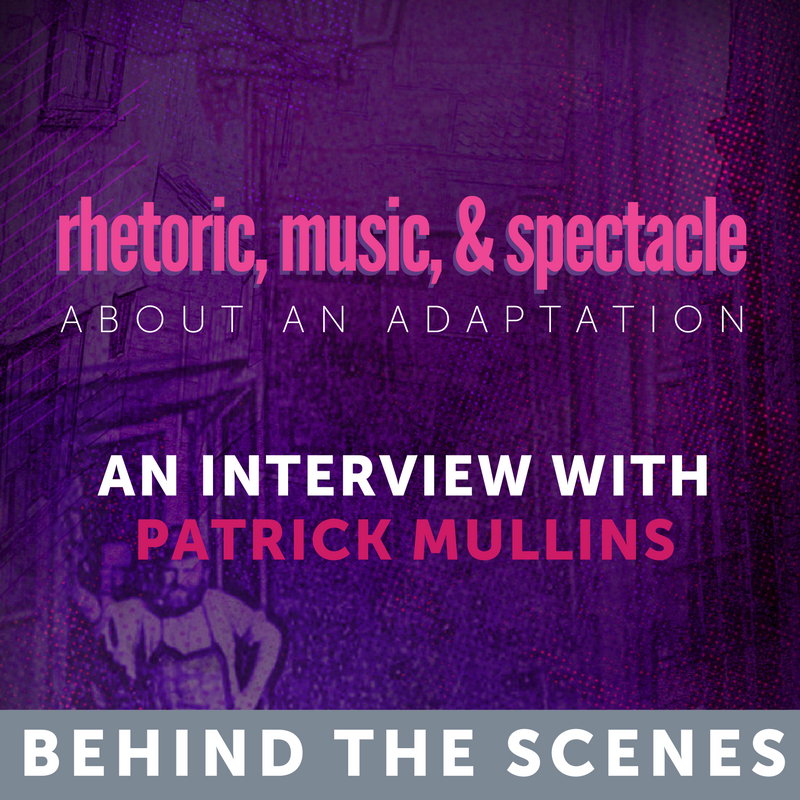We sat down with Patrick Mullins, who has been the driving force behind Oliver Twist. He has adapted Oliver Twist, as well as our current version of A Christmas Carol, and many other pieces here at Virginia Stage. We wanted to sit down and pick his brain about the process of taking a story to the stage.
Why Oliver Twist?
I like big, epic Fairy Tale stories because they are my favorite way of exploring our humanity. I'm familiar with the story of Oliver Twist the way most are familiar with Romeo and Juliet. People have loved both stories and I wanted to know why, and this awesome opportunity with The Governor’s School lent itself to this chance.
What steps or rituals do you do as you begin looking at adapting/directing a new work?
I usually start by investigation. What's out there about the story, what are the expectations an audience has. Second, I get in there and rip apart the story—what are the major events. With those two things, you then get to three which is finding the resonance of the story with the current time.
From what inspiration did you draw from which led you to this adaptation?
Every process has its own journey. Part of adapting a show is the finding out who is this for, where are we doing it, who can we work with, and why. I love finding artists who inspire me to work with, and letting their skill sets speak for the piece. It’s like that saying “Alone we know a little, and together we know a lot”. I think of myself more as a DJ then an author. Cause then you find these increased levels of resonance when you have Jake’s viewpoint, my viewpoints, Dickens, Nehprii’s…as you listen to them, you eventually find things that overlap and as you do, you know that those are the parts of the story that resonate for others.
There are many unique and talented artists working with you on this, did you have them in mind as the inspiration took shape or did their work inspire you in any way?
In "Patrick-world", I come at a show from Rhetoric, Music, and Spectacle. I like watching intimate work, but it's not the kind of things I like to work on. These bigger styles lend themselves to bigger questions. Theatre will always be about argument, presenting points of view; through music and spectacle...picture is worth a thousand...a sound is a thousand. I knew this process was going to be short, and I had a history with Jake’s music and point of view and knew it would be very accessible and good for the show. Then we needed spectacle, and so we got to looking around and we wanted someone with a different point of view. I can across Nehprii and instantly fell in love with her viewpoint, her puppet work, her visual work...I figured if we mixed all of these people up we would have a good soufflé.
What do you want audiences to take away from your adaptation of Oliver Twist that they might not get from any other production?
Well I hope they enjoy the show, first of all. I think it's important because it sets the audience up to listen to this show in a different way, and I hope for them to be able to see how much the world hasn't really changed. And how important it is for us to use our positions and roles to give back more to the people who have less; wherever you are in the hierarchy. The part of the story that makes me most uncomfortable is the happy ending. I love a happy ending, don't get me wrong; but I don't think anything is ever that black and white. I think Oliver goes through this journey, a hero's journey, to discover he was upper class the whole time. My big question is “Who does Oliver grow up to be?” now that we know this is who he is, how does he’s use the collective experiences he’s been on to shape who he grows up to be? And that’s the question I’d like people to walk away with in their heads.
It’s interesting you say that, given how much you love Fairy Tale stories and what they tell us as humans.
Fairy tales are stories for things we don't have words for. They explore the elements of ourselves that we aren’t comfortable with or don’t know. Those stories are usually happy in their endings, but I think that sometimes a happy ending lets our modern audiences off the hook. I want to needle them enough to make them think and feel without making them stop listening. You know, once upon a time we were in a world where people went out and rioted after plays, I’ve felt that way walking out of a number of shows. But today, when we’re competing with things like that device in your hand, an iPhone, we’re in a time where you need to want to listen and that’s what I hope Oliver Twist does for audiences.
Oliver Twist opens this Friday at TCC's Roper Performing Arts Center. Tickets are on sale now, online and through our Box Office (757.627.1234). You definitely don't want to miss this show!

